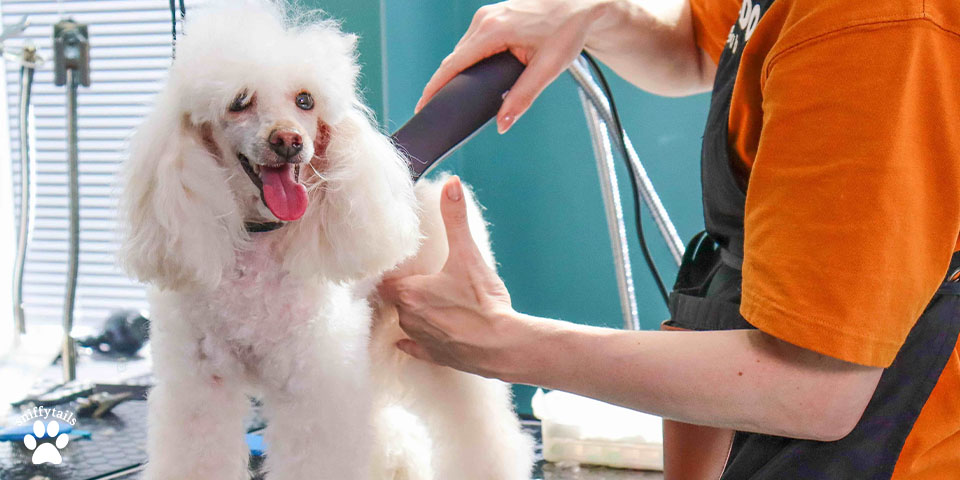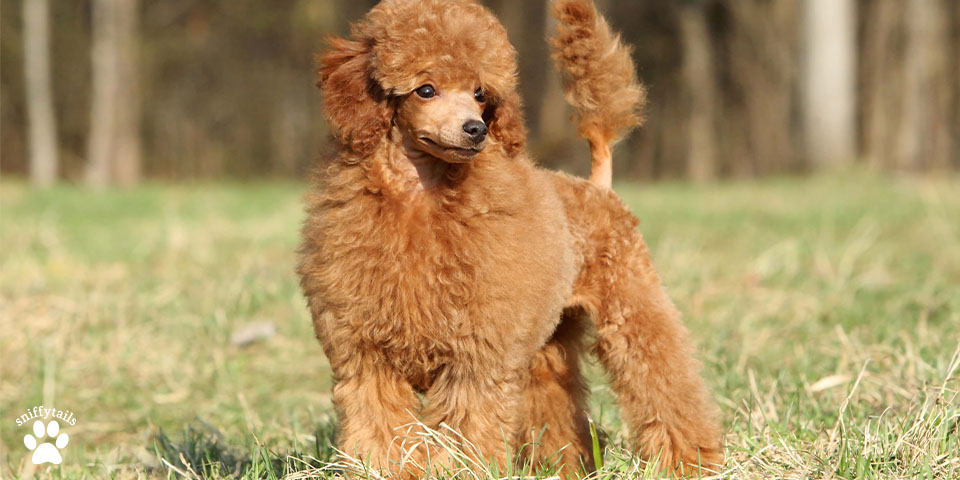How to Care for a Poodle
Topics of Our Article
TogglePoodle care involves regular grooming to manage their curly coats, including frequent brushing and trimming. A balanced diet tailored to their size and activity level is essential for their health. Poodles need daily exercise and mental stimulation through interactive play and training due to their high intelligence and energy levels. Regular vet check-ups are crucial to monitor for common health issues like hip dysplasia, eye problems, and skin conditions. Early socialization and consistent training help manage their active and social nature, ensuring a well-behaved and happy pet.
| Characteristic | Description |
| Origin | Germany, standardized in France |
| Sizes | Standard, Miniature, Toy |
| Temperament | Intelligent, trainable, friendly, playful |
| Intelligence | Highly intelligent, easy to train |
| Exercise Needs | Moderate to high exercise needs, enjoys activities |
| Grooming Needs | High grooming needs, regular brushing and trimming required |
| Lifespan | 12-15 years |
| Coat | Hypoallergenic, curly, requires regular grooming |
| Suitability | Suitable for families, singles, seniors; adaptable to various living spaces |

Poodles are one of the most recognizable and popular dog breeds worldwide. Originating from Germany and standardized in France, Poodles were initially bred as water retrievers. They come in three sizes: Standard, Miniature, and Toy, making them suitable for various living spaces and lifestyles. Poodles are renowned for their intelligence, trainability, and hypoallergenic coats, which make them excellent companions for families, singles, and seniors alike. Their playful and affectionate nature endears them to many, while their unique grooming requirements set them apart. Proper Poodle care is crucial to maintain their health and happiness, encompassing aspects such as nutrition, grooming, exercise, and regular veterinary check-ups. Understanding these needs ensures that Poodles not only thrive but also bring immense joy and companionship to their owners.
Understanding Poodles
Types of Poodles
Poodles come in three distinct varieties: Standard, Miniature, and Toy. The Standard Poodle is the largest of the three, known for its impressive stature and athletic abilities. The Miniature Poodle is a mid-sized option, combining the grace of the Standard with a more compact frame. Lastly, the Toy Poodle is the smallest, ideal for those living in smaller spaces or seeking a highly portable pet. Each type maintains the breed’s signature intelligence and hypoallergenic coat, making them a versatile choice for various lifestyles. Proper Poodle care is essential across all types, ensuring they receive the appropriate nutrition, grooming, and exercise tailored to their specific size and needs.
Temperament and Personality
Poodles are celebrated for their intelligent, active, and friendly nature. They are one of the most intelligent dog breeds, excelling in training and obedience due to their keen ability to understand and follow commands. This makes them a favorite in activities such as agility, obedience competitions, and even as therapy dogs. Their active nature requires regular physical and mental stimulation, which can be achieved through daily walks, playtime, and interactive toys. Poodles are also incredibly friendly, forming strong bonds with their families and getting along well with children and other pets. Their affectionate and social disposition makes them excellent companions, enhancing the joy and dynamic of any household. Ensuring proper Poodle care by addressing their exercise, social, and mental stimulation needs is crucial for a happy and well-adjusted pet.

Nutrition and Diet
Balanced Diet
A balanced diet is fundamental to maintaining the health and vitality of your Poodle. Providing high-quality dog food that is rich in essential nutrients supports their overall well-being. Look for dog food brands that offer a balanced mix of proteins, fats, carbohydrates, vitamins, and minerals. Ensuring that your Poodle receives a diet with the right proportions of these nutrients helps in promoting healthy skin and coat, strong bones, and optimal energy levels. Proper Poodle care includes regular assessment of their dietary needs and adjusting their food intake to suit their age, size, and activity level.
Feeding Schedule
Establishing a consistent feeding schedule is crucial for your Poodle’s digestion and routine. Typically, adult Poodles should be fed twice a day, while puppies may require more frequent meals to support their rapid growth and development. Sticking to a regular feeding schedule helps in maintaining stable energy levels and prevents overeating, which can lead to obesity and related health issues. Monitoring your Poodle’s weight and adjusting portion sizes as necessary is an essential part of effective Poodle care.
Special Dietary Needs
Poodles, like many other breeds, can have special dietary needs due to allergies and sensitivities. Common allergens include certain proteins (such as chicken or beef), grains, and artificial additives. Symptoms of food allergies can manifest as skin irritations, digestive issues, or behavioral changes. If you suspect your Poodle has a food allergy, consult with a veterinarian to identify the allergens and adjust their diet accordingly. Providing hypoallergenic or specialized dog food can help manage these conditions effectively. Being attentive to your Poodle’s specific dietary requirements and making appropriate adjustments is a critical aspect of comprehensive Poodle care.
Exercise and Activity
Daily Exercise
Daily exercise is crucial for keeping your Poodle healthy and happy. Poodles are an active breed that thrives on physical activity. Recommended activities include brisk walks, jogging, and playing fetch. Standard Poodles typically require at least an hour of exercise daily, while Miniature and Toy Poodles can often be satisfied with 30-45 minutes of activity. Engaging in regular physical activities not only helps maintain their weight but also promotes cardiovascular health. Incorporating varied exercises into your routine ensures your Poodle remains fit and energetic, which is an essential part of Poodle care.
Mental Stimulation
In addition to physical exercise, Poodles require ample mental stimulation to prevent boredom and associated behavioral issues. Providing a variety of toys, such as puzzle feeders, interactive toys, and chew toys, can keep them engaged. Games like hide-and-seek, obedience training, and agility courses also offer excellent mental challenges. Regularly introducing new toys and games will stimulate their minds and keep them entertained. Mental enrichment contributes significantly to their overall well-being and happiness.
Socialization
Socialization is another key aspect of a Poodle’s development. Interacting with other dogs and people helps them become well-adjusted and confident. Regular trips to the dog park, playdates with other dogs, and participation in obedience classes can enhance their social skills. Positive social experiences are crucial, especially during their early years, to prevent fearfulness and aggression. Ensuring your Poodle is well-socialized fosters a friendly and adaptable companion.
By incorporating these elements of exercise, mental stimulation, and socialization into your routine, you can provide a well-rounded approach that supports their physical, mental, and emotional health.

Grooming Essentials
Coat Care
Regular coat care is essential for maintaining the distinctive, hypoallergenic fur of a Poodle. Their curly coats require frequent brushing to prevent matting and tangles, which can cause discomfort and skin issues. Using a slicker brush or comb designed for curly coats can help manage their fur effectively. Brushing should be done at least three to four times a week, and more often if your Poodle enjoys outdoor activities. Proper Poodle care includes being diligent about their coat maintenance to ensure their fur remains healthy and beautiful.
Bathing
Bathing your Poodle is another crucial aspect of grooming. Generally, Poodles should be bathed every three to six weeks, depending on their activity level and coat condition. Using a high-quality dog shampoo that is gentle on their skin will help maintain their coat’s natural oils. Be sure to rinse thoroughly to avoid any residue that could cause irritation. Proper Poodle care involves following these best practices for bathing to keep your Poodle clean and comfortable.
Trimming and Clipping
Regular trimming and clipping are necessary to keep a Poodle’s coat manageable and stylish. Many owners opt for professional grooming services every six to eight weeks, where experienced groomers can trim the coat, clip the nails, and check for any skin issues. If you prefer to groom your Poodle at home, invest in quality grooming tools and learn the basics of Poodle haircuts, such as the “puppy cut” or “continental clip.” Consistent grooming sessions are vital for overall Poodle care and help in maintaining their elegant appearance.
Dental Care
Dental care is often overlooked but is a critical component of a Poodle’s overall health. Regular brushing of your Poodle’s teeth helps prevent plaque buildup, gum disease, and bad breath. Using a dog-specific toothbrush and toothpaste, aim to brush their teeth several times a week. Additionally, providing dental chews and toys can help maintain oral hygiene. Ensuring good Poodle care includes paying attention to their dental health to prevent potential issues that could affect their quality of life.
By adhering to these grooming essentials, you can keep your Poodle looking their best and ensure their well-being through comprehensive Poodle care.
Health Care
Regular Vet Visits
Regular vet visits are fundamental to maintaining your Poodle’s health. These check-ups are vital for early detection and prevention of potential health issues. Key components of regular vet visits include:
-
- Physical Examinations: Comprehensive check-ups to assess overall health.
-
- Vaccinations: Keeping up-to-date with essential vaccines to prevent diseases.
-
- Deworming and Flea Control: Treatments to keep parasites at bay.
-
- Routine Blood Tests: Monitoring for any underlying health issues.
-
- Dental Check-Ups: Ensuring good oral health and preventing dental diseases.
Consistent veterinary care helps monitor your Poodle’s overall health and ensures they remain in peak condition throughout their life. Incorporating regular vet visits into your Poodle care routine is essential for their long-term well-being.
Common Health Issues
Being aware of common health issues in Poodles can help you recognize early signs and seek prompt veterinary attention. Some typical ailments in Poodles include:
-
- Hip Dysplasia: A genetic condition affecting the hip joints, causing pain and mobility issues.
-
- Progressive Retinal Atrophy (PRA): An inherited eye disorder leading to blindness, often identifiable by night blindness and dilated pupils.
-
- Epilepsy: Characterized by recurrent seizures, it can significantly impact your Poodle’s quality of life.
Regular screening and early diagnosis are key to managing these conditions effectively. Understanding and recognizing these common health issues is a critical aspect of comprehensive Poodle care.
By ensuring regular vet visits and being vigilant about common health issues, you can provide your Poodle with the best possible care, enhancing their quality of life and longevity.

Training Tips
Basic Commands
Teaching your Poodle basic commands is an essential part of their training and contributes significantly to their good behavior and safety. Key commands to focus on include:
-
- Sit: Start with a treat in hand, move it over their head, and as they follow it, their bottom will naturally lower. Reward them immediately and repeat.
-
- Stay: Once your Poodle knows “sit,” tell them to stay while you step back gradually, increasing the distance over time. Always reward them for staying in place.
-
- Come: Use a happy tone, call your Poodle’s name followed by “come,” and reward them when they reach you. Practice this command frequently in various environments.
Incorporating these basic commands into your Poodle care routine will help create a well-behaved and responsive pet, making daily interactions more enjoyable and stress-free.
House Training
House training, or potty training, is a critical aspect of ensuring your Poodle’s cleanliness and your home’s hygiene. Effective house training tips include:
-
- Consistent Schedule: Take your Poodle out at the same times every day, such as after meals, naps, and playtime.
-
- Designated Spot: Always take your Poodle to the same spot outside to do their business, helping them associate the area with potty time.
-
- Positive Reinforcement: Reward your Poodle with treats and praise immediately after they successfully go outside. Avoid punishment for accidents, as it can create fear and confusion.
Patience and consistency are key. House training can take several weeks, but with dedication, your Poodle will learn the routine, which is a crucial element of Poodle care.
Behavioral Training
Addressing common behavioral issues like barking or chewing is important for maintaining a peaceful household and ensuring your Poodle’s well-being. Key strategies include:
-
- Barking: Identify the cause of barking (e.g., boredom, anxiety, or territorial behavior) and address it. Use commands like “quiet” and reward silence. Ensure they get plenty of physical and mental stimulation to reduce boredom.
-
- Chewing: Provide appropriate chew toys to satisfy their natural chewing instinct. Redirect from inappropriate items and praise when they chew on the correct toys. Consistent training and supervision are essential.
Behavioral training not only improves your Poodle’s behavior but also strengthens your bond with them. Implementing these strategies as part of Poodle care ensures a harmonious living environment and a happy, well-adjusted pet.
By following these training tips, you can effectively teach your Poodle important commands, house train them, and address common behavioral issues, making them a well-mannered and delightful companion.
Conclusion
In conclusion, providing excellent care for your Poodle involves attention to various aspects such as nutrition, grooming, exercise, health care, and training. Ensuring a balanced diet and consistent feeding schedule promotes their health and vitality. Regular grooming keeps their distinctive coat in top condition, while proper exercise and mental stimulation maintain their physical and mental well-being. Regular vet visits and awareness of common health issues help in early detection and effective management of any potential problems. Effective training, including basic commands, house training, and behavioral training, enhances your Poodle’s behavior and your daily interactions. By following these guidelines, you can ensure that your Poodle leads a happy, healthy, and fulfilling life. Poodles bring immense joy and companionship to their owners, making the investment in their care truly rewarding.